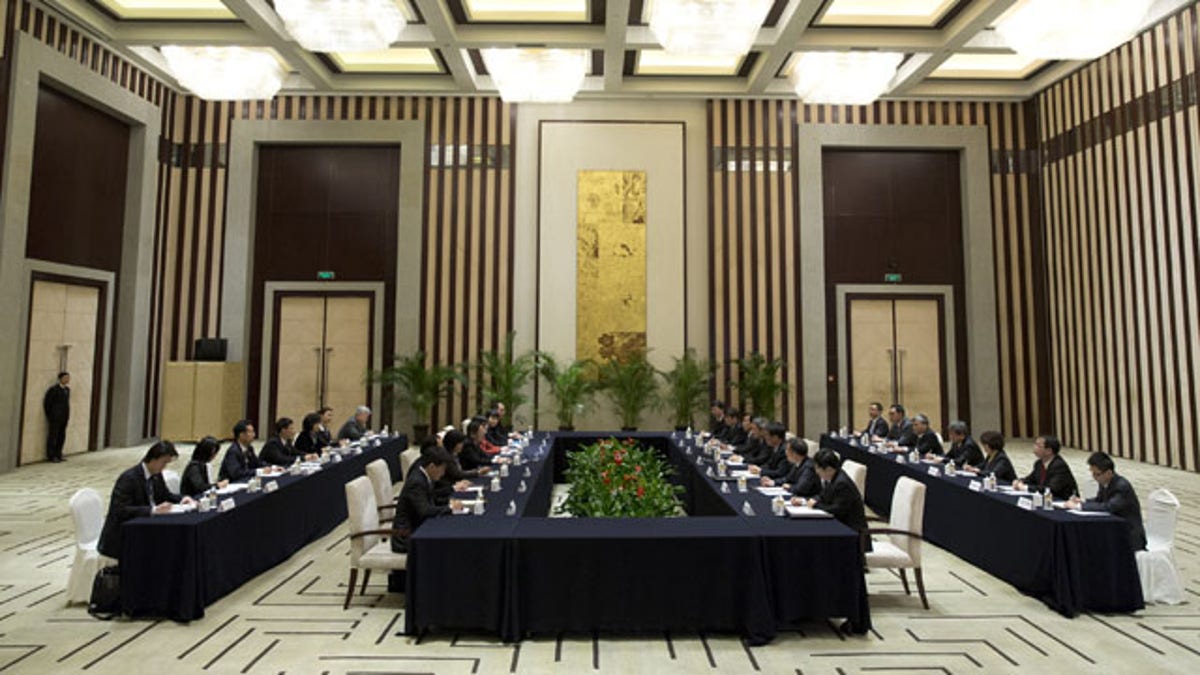
February 11, 2014: Chinese and Taiwanese negotiators, including Zhang Zhijun, director of China's Taiwan Affairs Office, and Wang Yu-chi, head of Taiwan's Mainland Affairs Council, talk during their meeting in Nanjing, in eastern China's Jiangsu Province. (AP)
NANJING, China – Representatives of China and Taiwan met Tuesday in Nanjing for their highest-level talks since their split in 1949, a landmark step despite Beijing's refusal to recognize the self-governing island's sovereignty.
The choice of Nanjing as the venue has special resonance because it was the capital of Chiang Kai-shek's Nationalist government during the war against Mao Zedong's communists before the Nationalists were forced 65 years ago to flee the mainland for Taiwan. It also is home to the tomb of the founder of republican China, Sun Yat-sen, who is revered in both Beijing and Taipei.
Expectations for the meeting, which will shift after two days to Shanghai, were measured.
The head of the Chinese delegation, Zhang Zhijun, said the talks were aimed at consolidating the consensus reached at previous meetings. He didn't offer any specifics.
"Our meeting had been something unimaginable before, but if we really want to achieve breakthroughs we must apply a bit of creativity," Zhang said.
Taiwan's lead negotiator Wang Yu-chi said the meeting "shows that the two sides' relations have truly entered a new stage and this is truly a day for the record books."
While the official agenda for the talks was not disclosed, it was likely to have been heavily focused on trade. Beijing wants to see Taiwan ratify a trade services agreement that would allow the sides to open a wide range of businesses in each other's territory. Beijing approved the accord more than six months ago but it remains stuck in Taiwan's legislature, a reflection of public fears of being overwhelmed by their giant neighbor.
It is in China's interests to build trade relations with Taiwan, which it considers part of its territory and wants an eventual reunification. Previous threats to attack the island if it declares formal independence or delays unification indefinitely have only antagonized Taiwanese people. In 1995-96, China fired missiles, conducted military exercises off the Taiwanese coast, and tried to influence its internal politics, further alienating Taiwanese people.
But China took a less confrontational approach a decade ago under former president and Communist Party leader Hu Jintao. The policy received a boost when a pro-China government of President Ma Ying-jeou was elected in 2008, giving Beijing the opportunity to use the trade carrot as the centerpiece of its Taiwan policy in the apparent hope that it will force Taiwanese people to look at relations with China more favorably and tamp anti-China sentiments.
Since 2008, trade doubled to $197.2 billion last year. Taiwan enjoys a $116 billion trade surplus with China, one of the few countries or regions that can boast that. Taiwanese companies have invested hundreds of billions of dollars in the mainland, with companies such as Foxconn employing millions of workers making iPhones, Playstations and other popular goods.
Taiwan also benefits heavily from an opening to Chinese tourists, who travel across the 150-kilometer (100-mile) Taiwan Strait.
Before the start of the talks, Taiwan's Wang said he hoped to discuss setting up permanent representative offices on each other's territory and would push for greater Taiwanese representation in international organizations — something Beijing has resisted.
There have been indications China is eager for movement on the political front, in addition to the growing economic ties, with Chinese President Xi Jinping telling a Taiwanese envoy at an international gathering in Indonesia last year that the issues should not be handed down from generation to generation.
Beijing is keen to consolidate the gains while Ma is still in power. With national elections looming in 2016, he has become increasingly unpopular and opposition to unification has been hardening despite the economic ties. About 80 percent supporting the status quo of de-facto independence and just a sliver backing unification outright.
